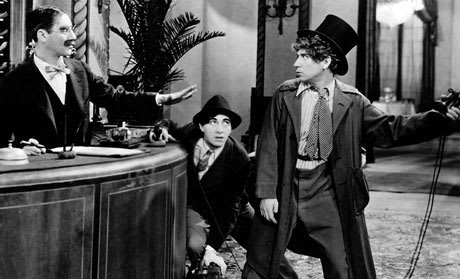There are numerous interchangeable glamour girls lurking in the background of The Cocoanuts (1929). They're usually in chorus lines, kicking their legs in rigidly choreographed routines to some god-awful love song, with frozen little grins on their glassy-eyed faces. They certainly blend in with the setting – a lot of plywood palm trees and painted skies forming a makeshift Florida. Based on a stage play by George S. Kaufman for the Marx Brothers, with music by Irving Berlin (in fact, the only Berlin musical to spawn no hit songs), The Cocoanuts (1929) is, for all intents and purposes, a filmed reproduction of that play, from the variety show format to the plywood chorus girls/palm trees. Tied together by a very thin story involving the goings-on at a resort owned by Groucho, the film shifts episodically between a romance involving two lovers (played by a couple of zombies named Oscar Shaw and Mary Eaton) entangled in tepid intrigue over stolen diamonds, musical numbers and Marx Brothers comedy before finally turning into a straight-up musical revue in its second half, with Groucho introducing various performances. Unlike later Marx Brothers films, such as Duck Soup and A Night at the Opera, the absurdities don't build on top of each other into any momentum; it's just many routines thrown together at random. There's still a lot of good stuff scattered throughout, like Groucho's usual torrent of insults towards Margaret Dumont ("I can see you now, you and the moon… you wear a necktie so I'll know you"), a set piece involving a rigged auction gone wrong and a clever routine between Groucho and Chico based on the extremely unlike confusion of the word "viaduct" with "why a duck." And because The Cocoanuts is such an interesting historical document – as a record of a popular '20s Broadway play; as a typical revue-style musical/comedy of the early talkie period; as an example of the imperfect sound recording technology of the early talkie period; and as the first film starring the Marx Brothers, with their personas already fully formed –pejoratives like "bad" and "rickety" are not only inadequate, but beside the point. Let's put it this way: anyone in the market for a musical/comedy of the early talkie period will be delighted to hear that the glamour-girls are rigid and glassy-eyed. The DVD is the same disc as the one in Universal's 2004 Marx Brothers Collection; the image quality is variable and sometimes quite poor, culled together from various sources and clearly un-restored. There are no extras. Stray observation: even for an early Marx Brothers movie, poor Zeppo really doesn't have much to do.
(Universal)The Cocoanuts
Robert Florey, Joseph Santley

BY Will SloanPublished Jul 11, 2011